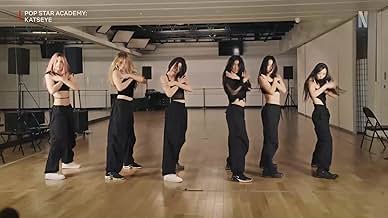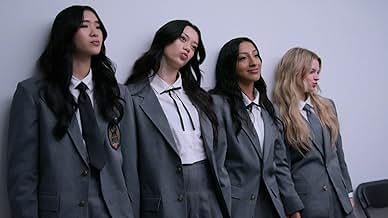Nesta série documental sobre a criação do primeiro grupo feminino internacional da HYBE x Geffen, vinte garotas passam por um programa de treinamento do K-pop.Nesta série documental sobre a criação do primeiro grupo feminino internacional da HYBE x Geffen, vinte garotas passam por um programa de treinamento do K-pop.Nesta série documental sobre a criação do primeiro grupo feminino internacional da HYBE x Geffen, vinte garotas passam por um programa de treinamento do K-pop.
Explorar episódios
Avaliações em destaque
I get the feeling that the makers of this show had the intention of creating a buzz around the formation of the next big girl group. Instead, I've watched a social experiment where teenage girls are subjected to harsh regimes, criticisms, and anxiety, all in the name of being famous and making some producers a lot of money. I appreciate that pop stars have to deal with a lot in their careers, but this really shows the shallow and ugly side of the music industry. I would say it's worth a watch just to understand the pop music industry more (read "don't let your children get involved"), but it won't be as entertaining as you might hope. The only saving grace is how nice it is that the girls support one another.
This series amounts to an 8 episode advertisement for a new global K-Pop band. The documentary makers retain some integrity for not shying away completely from the cruelty of the process the girls were put through, but ultimately they seem to have made several editorial decisions intended to soften those cruel edges.
The filmmakers can't be blamed for the awful management of the project at the heart of the show, but you do detect a deliberate decision to refrain from tarnishing the image of HYBE and Geffen Records too much (the music megacorps behind what can only be describe as an extended theatre of cruelty performance), lest Netflix not be invited back for another season.
The show follows an international group of very young women (14-21), as they're put through a two year training camp for what they think will be an internal selection process by the record label to create a new 'global' k-pop group, only to discover that they've signed up to a 'survivor show' at the end of it to decide the final members of the band. A 'survivor show' is the K-Pop version of the old TV pop talent shows from the west like 'Popstars' franchise - but conspicously more sinister.
Many of the girls come from clearly disenfranchised backgrounds (including one girl who is a refugee), however little is made of this by the producers, who give everyone's backstory a few glossy unsentimental minutes. Only one of the girls gets a huge amount of backstory - and even then it's all very superficial.
Nothing is explained in regards to income for the girls, we don't know if they're being paid during this years long process (some of the girls mention having no money as they pack their hopes and dreams into suitcases after being ejected from the program).
We also never linger over what these very young girls are giving up to be here, one girl mentions taking her place as a trainee has prevented her from graduating high school - but this is treated as nothing more than a funny anecdote, and no further enquiries are made.
Equally, a discussion between the girls about being away from home - in which one girl admits not being able to speak to her family for weeks - simply drifts by onscreen, unexplored.
Perhaps the most obvious of these attempts to shield HYBE and Geffen Records from public scrutiny regarding the cruelty of the process, comes at the expense of what would otherwise be a rather critical scene for a show like this.
Once the girls have made it to the 'public' survivor show part of the process, they take part in three elimination rounds which are judged partially (and it is only very partially) by members of the public.
The elimination scene for the first round is heartbreaking, the second elimination scene is harrowing, and the third elimination scene was presumably so brazenly vicious that it's given the 'off screen death' treatment, where we skip from the girls arriving to hear whether or not they've wasted the last two years of their girlhood from a disembodied voice on a television screen, to a montage of the survivors tearfully calling their loved ones to report their Kpop dreams are still alive - giving strong disaster survivor vibes.
Yet there is a slightly less obvious, but none the less very telling detail in the documentary that belies the filmmakers obedience to the HYBE/Geffen machine - the lack of follow up.
Unlike other Netflix shows following a bunch of kids as they try to achieve their dreams in time limited settings (Cheer competitions, Basketball finals, Football drafts) - after the final 6 have been picked, and the credits start to roll - we do not get the usual 'where are they now' pre-credit closure snippets of the one's who didn't make it on the show. Indeed, it seems, that like the rest of the whole show, the ending is an exercise in minimisation and distraction - nudging the audience not to think about the brutality of the process, rather to just enjoy the shiny happy teens who've emerged victorious from a process none of them fully understood they were consenting to when they skipped over the small print in their application forms.
The access the producers had for the documentary could have been used for that most noble of documentary pursuits - making tangible change in the world. It would have taken barely any effort to turn their footage into an expose that could have led to mass calls for reform in an industry that consistently exploits minors.
Instead, hemmed in buy cowardice and perhaps corporate interest too, the filmmakers leave their audience with an uneasy sense of being complicit in an extended episode of emotional and financial abuse - without our concent, much like the girls featured in the show.
The filmmakers can't be blamed for the awful management of the project at the heart of the show, but you do detect a deliberate decision to refrain from tarnishing the image of HYBE and Geffen Records too much (the music megacorps behind what can only be describe as an extended theatre of cruelty performance), lest Netflix not be invited back for another season.
The show follows an international group of very young women (14-21), as they're put through a two year training camp for what they think will be an internal selection process by the record label to create a new 'global' k-pop group, only to discover that they've signed up to a 'survivor show' at the end of it to decide the final members of the band. A 'survivor show' is the K-Pop version of the old TV pop talent shows from the west like 'Popstars' franchise - but conspicously more sinister.
Many of the girls come from clearly disenfranchised backgrounds (including one girl who is a refugee), however little is made of this by the producers, who give everyone's backstory a few glossy unsentimental minutes. Only one of the girls gets a huge amount of backstory - and even then it's all very superficial.
Nothing is explained in regards to income for the girls, we don't know if they're being paid during this years long process (some of the girls mention having no money as they pack their hopes and dreams into suitcases after being ejected from the program).
We also never linger over what these very young girls are giving up to be here, one girl mentions taking her place as a trainee has prevented her from graduating high school - but this is treated as nothing more than a funny anecdote, and no further enquiries are made.
Equally, a discussion between the girls about being away from home - in which one girl admits not being able to speak to her family for weeks - simply drifts by onscreen, unexplored.
Perhaps the most obvious of these attempts to shield HYBE and Geffen Records from public scrutiny regarding the cruelty of the process, comes at the expense of what would otherwise be a rather critical scene for a show like this.
Once the girls have made it to the 'public' survivor show part of the process, they take part in three elimination rounds which are judged partially (and it is only very partially) by members of the public.
The elimination scene for the first round is heartbreaking, the second elimination scene is harrowing, and the third elimination scene was presumably so brazenly vicious that it's given the 'off screen death' treatment, where we skip from the girls arriving to hear whether or not they've wasted the last two years of their girlhood from a disembodied voice on a television screen, to a montage of the survivors tearfully calling their loved ones to report their Kpop dreams are still alive - giving strong disaster survivor vibes.
Yet there is a slightly less obvious, but none the less very telling detail in the documentary that belies the filmmakers obedience to the HYBE/Geffen machine - the lack of follow up.
Unlike other Netflix shows following a bunch of kids as they try to achieve their dreams in time limited settings (Cheer competitions, Basketball finals, Football drafts) - after the final 6 have been picked, and the credits start to roll - we do not get the usual 'where are they now' pre-credit closure snippets of the one's who didn't make it on the show. Indeed, it seems, that like the rest of the whole show, the ending is an exercise in minimisation and distraction - nudging the audience not to think about the brutality of the process, rather to just enjoy the shiny happy teens who've emerged victorious from a process none of them fully understood they were consenting to when they skipped over the small print in their application forms.
The access the producers had for the documentary could have been used for that most noble of documentary pursuits - making tangible change in the world. It would have taken barely any effort to turn their footage into an expose that could have led to mass calls for reform in an industry that consistently exploits minors.
Instead, hemmed in buy cowardice and perhaps corporate interest too, the filmmakers leave their audience with an uneasy sense of being complicit in an extended episode of emotional and financial abuse - without our concent, much like the girls featured in the show.
Taking young girls, lying to them, manipulating them and overworking them is crazy twisted. This does NOT paint the label or the executives that approved this project in a good light. Towards the end felt like the teachers were trying their best to damage-control the girls' mental healths in the face of the horrible executive decision-making. Feels like I'm watching some kind of twisted social experiment - barely feels legal to treat anyone like this, let alone under 18's. I didn't care at all about who ended up in the group by the end and just felt bad all round for all of the girls that were subjected to 2 YEARS of this. This is a lesson on how NOT to build a lasting global pop group.
I marveled at what an amazing training opportunity this was for the tremendously talented girls aspiring to be professional entertainers. 1-2 years of coaching every day by the industry's best. Seeing how the coaches polished the participants who already had natural talent, and in most cases, many years of training already reminded me of the many levels between better and best.
Is it good television? It is a documentary of two major entertainment companies investing in a project with potential billion dollar returns. Every decision made is a business decision, with the girls as business inputs. Nevertheless, I appreciated getting to know the trainees.
Some of my favorites did not get chosen in the end. Good luck to both those who made it in the group and to the ones who didn't make it, who no doubt will go on to successful careers in the entertainment industry.
Is it good television? It is a documentary of two major entertainment companies investing in a project with potential billion dollar returns. Every decision made is a business decision, with the girls as business inputs. Nevertheless, I appreciated getting to know the trainees.
Some of my favorites did not get chosen in the end. Good luck to both those who made it in the group and to the ones who didn't make it, who no doubt will go on to successful careers in the entertainment industry.
Love seeing al the contestants be so nice to each other and form deep relationships, they all worked soooo hard!!! Huge respect!
Hated the fact that all these lovely people did not know what they signed up for and got lied to by the makers of the show
The makers said things like, fans want drama and the show needs it
NO WE DON'T WANT DRAMA!!! WE WANT TO SEE GIRLS FOLLOW THEIR DREAMS, HYPING EACH OTHER UP, HELPING EACH OTHER, they did exactly that, But the makers ruined it
This show missed the mark, it wasted it's own potential by choice, could have been a great launce for a new gil band!!!
Hated the fact that all these lovely people did not know what they signed up for and got lied to by the makers of the show
The makers said things like, fans want drama and the show needs it
NO WE DON'T WANT DRAMA!!! WE WANT TO SEE GIRLS FOLLOW THEIR DREAMS, HYPING EACH OTHER UP, HELPING EACH OTHER, they did exactly that, But the makers ruined it
This show missed the mark, it wasted it's own potential by choice, could have been a great launce for a new gil band!!!
Principais escolhas
Faça login para avaliar e ver a lista de recomendações personalizadas
Detalhes
- Data de lançamento
- Países de origem
- Central de atendimento oficial
- Idioma
- Também conhecido como
- Học Viện Pop Star: KATSEYE
- Empresas de produção
- Consulte mais créditos da empresa na IMDbPro
- Tempo de duração1 hora
- Cor
- Mixagem de som
Contribua para esta página
Sugerir uma alteração ou adicionar conteúdo ausente

Principal brecha
By what name was Pop Star Academy: KATSEYE (2024) officially released in Canada in English?
Responda



















